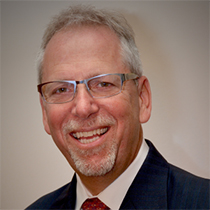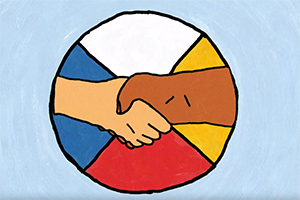
By Cam Stewart Mikostahpinukum (Red Morning), a member of the Rotary Club of Calgary East (District 5360) and one of six members honored by Rotary International as Champions of Inclusion
While an officer with the Calgary Police Service in 2000, I attended an Aboriginal Justice Camp where I first learned about the true history of Indigenous people. That history has included colonization, discrimination, and racism, all which have impacted current generations. I made a commitment that day that I would continue my knowledge journey and work toward correcting injustices.
For the next 20 years, I worked with Indigenous leaders and allies to address human rights issues in Alberta. I was also invited to and participated in traditional ceremonies and practices, including vision quests, sun dances, pow wows, and sweats.
Because of my efforts, community leaders approached local Elders, where they recommended me for a traditional name. In December 2019, I was gifted the Blackfoot name of Mikostahpinukum “Red Morning” by Sisksika Elder Herman Yellow Old Woman. Being given this powerful name has been my inspiration to wake up each morning and use my positions and influence to improve things for current and future generations of Indigenous families and youth.

Watch a three-minute video of Cam Stewart discussing his work with Indigenous inclusion
Championing diversity and Indigenous strategies within Rotary has been one of the most exciting adventures of my life and one of my greatest challenges. In Rotary, I believe we are well positioned to model inclusion in our business, professional, and personal lives.
In many ways, Rotary clubs are not that different from Indigenous nations, tribes, or groups I have worked with. Both are groups of people with a common character, occupation, or interest. Like a tribe, each Rotary club has its own personality.
People join and stay in tribes (or Rotary clubs) to find places of belonging. As our communities change, we have to re-evaluate our priorities and programs, and how they align with our current and future membership.
But change is not easy, either for tribes or Rotary clubs. Some people have a fear of losing their individual identity or that of the group. I have learned that it is valuable to provide a “brave space” when advancing topics of including traditionally excluded people.
A brave space is more than a “safe space.” In brave spaces, people are encouraged to speak up and share their perspectives, even when the conversation may be uncomfortable or risky. When leading these conversations, I do not challenge a person’s values or beliefs. But I do try and identify any myths they may have (about their tribe or other tribes or groups) that create a barrier to understanding.
I have had the privilege of leading District 5360’s strategy for inclusion as chair of our Indigenous Relations Committee. Our committee includes Indigenous leaders who are not members of Rotary who work alongside us in exploring issues in our communities that impact inclusion and brainstorm solutions to them. I have been approached by many Rotarians who are appreciative of this work and have said this kind of initiative has encouraged them to stay in their club and be active in Rotary. Some of these members are now champions of Indigenous inclusion and engagement in their clubs and communities.
Our district now has more than 100 of these champions – early adopters and advocates – who have joined a Community of Practice (CoP). This CoP provides a brave space for these leaders to learn and support each other. In many ways, it is modeled after the Indigenous worldview – working together collectively for the betterment of the tribe.
There have been many successes. But this has not been an easy journey. We have the support of our leaders and Rotary members. But there are also those who are resistant to change. It’s human nature and a universal reality. To address this, we look at every conflict or setback as a learning opportunity.
For example, when concerns were raised about the use of land acknowledgements, we provided training. When members wanted to build relationships with Indigenous people, we hosted networking events.
It is my hope that Rotary will foster and encourage many more “Champions of Inclusion.” This can be done by listening to those who have concerns or express opposition, building understanding, and working with the support of allies both within our clubs and in our communities.
A special recording of the Rotary People of Action: Champions of Inclusion celebration is available on demand until 30 September. This celebration helps us imagine what’s possible when people of action come together to build a sense of belonging and respect for all people through Rotary.
https://blog.rotary.org/2023/06/22/using-brave-spaces-to-talk-about-diversity-inclusion/

